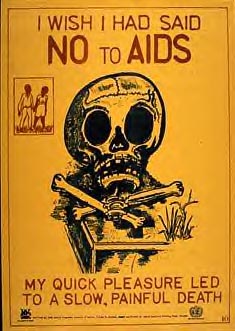




If they can do it in Uganda,
why can't we do it here?







If they can do it in Uganda,
why can't we do it here?


If they can do it in Uganda, why can't we do it here?
3-2-2003
For more than two years, I've been calling on the safer-sex boyz to address not merely risk-reduction, but cultural change.
And for doing so, I've been called a crank and a crackpot, my posts have been censored and my articles rejected.
Yet today, in the NY Times, a medical anthropologist at Harvard examines Uganda's exceptionally successful AIDS prevention programs, and credits -- cultural change.
What did Uganda do?
It urged its citizens to abstain or be faithful; only if you can do neither, said Uganda, do you need to use a condom.
Uganda began its approach in 1986, and by the late 80s infection rates were dropping.
And, says the Times, "By 1995, according to a survey financed by the United States, 95 percent of Ugandans were reporting either one or zero sexual partners in the past year."
Those who say we cannot affect similar behavioral change in the gay male community in the US are LYING.
Why do they lie?
To prop up a tired, dreary culture of anal promiscuity which is dying and deserves to die.
And, in too many cases, to protect income which is dependent upon that culture.
Income from the AIDS industry, from pornography, even from gay travel, most of which, even when it's not aimed at the exploitation of unfortunates in impoverished countries, is tourism in the service of sex.
Yet the truth is that it is possible to change a culture, even a sexual culture.
And change it for the better.
The Times article is pasted in below.
The emphases are mine.
bill
OP-ED CONTRIBUTOR
By EDWARD C. GREEN
The ABC approach is not only about abstinence. It is about
providing people with more options for preventing AIDS.
CAMBRIDGE, Mass.
There have been suggestions that President Bush was able to promise $10 billion in new money to fight the AIDS pandemic in part because there is now a way to spend the prevention part of this sum (about half) in a way that is acceptable to conservatives. It's true that conservatives favor this approach, but that doesn't mean it doesn't work.
The initiative is based on what is called the "ABC approach." People might well wonder what this model is and what evidence supports it. Here is a summary of Uganda's experience.
We now know that the rate of new H.I.V. infections in Uganda started to decline in the late 1980's. But foreign experts began showing up in force in Uganda only in the early 1990's. Moreover, there were very few condoms in Uganda when the epidemic began to slow; they became widely available only after the experts appeared. Weren't "we" supposed to teach "them" how to prevent AIDS?
What happened was that beginning in 1986, Uganda tried to bring about nothing less than fundamental change in sexual behavior. It developed a low-cost program whose message, delivered by everyone from President Yoweri Museveni on down, was this: Stop having multiple partners. Be faithful. Teenagers, wait until you are married before you begin sex.
This is what has become known as the ABC model: Abstain, Be faithful, use Condoms if A and B fail.
By 1995, according to a survey financed by the United States, 95 percent of Ugandans were reporting either one or zero sexual partners in the past year. Moreover, the proportion of sexually active youth declined significantly from the late 80's to the mid-90's. The greatest percentage decline in H.I.V. infections and the greatest degree of behavioral change occurred in those 15 to 19 years old. This was also the group with the fewest AIDS deaths -- showing that it was most likely behavior and not death rates that reduced infection rates.
Though only 8 percent of Ugandans aged 15 to 49 reported using condoms recently -- this according to the 2000 Demographic and Health Survey, which is conducted for the United States Agency for International Development -- the important thing is that those 8 percent engaged in practices that put them at the highest risk of H.I.V. infection.
Why wasn't condom use more of a factor in Uganda's success in fighting AIDS? Partly it was Mr. Museveni's skepticism that in a country where it was difficult even to find aspirin, condoms could be supplied in adequate numbers. So the priority in the ABC approach is on A and B. Elsewhere, prevention typically begins and ends with C, in practice if not design.
But because the ABC approach is starting to be embraced by conservatives in the United States, some AIDS groups have been reluctant to believe it could be effective. Too often I've started to explain how the Ugandan H.I.V. rate began to drop after people started having fewer sexual partners, only to be met with a look of suspicion or condescension and informed that abstinence doesn't work.
Yet, when Africans are asked how they have changed their behavior in the face of AIDS, the great majority don't talk a lot about condoms. They talk about becoming monogamous, says a 2002 United Nations study that summarized years of research. Furthermore, young people report waiting until they are older to begin sex.
The ABC approach is not about that great conversation-stopper, "abstinence only." It is about providing people with more options for preventing AIDS. Some people cannot or will not change their behavior, and so of course they need to use condoms. But while condom use was one of the options Uganda has promoted, faithfulness to one partner is probably the major contributor to the country's success. We need to develop a balanced approach by recognizing that Africa and the West have different types of epidemics and going beyond the fruitless battle between the abstinence and condom camps.
Edward C. Green, a medical anthropologist at the Harvard School of Public Health, is author of the forthcoming "Rethinking AIDS Prevention."
So: on this site we will continue to call for cultural change, including
Fidelity among men who have sex with men.
And we will succeed.
The
analists have based their culture on domination, kink, and raunch -- and created a community riddled with disease.
We base our culture on the beauty and spirituality inherent in the uniquely male act of
phallic mating, and our community on the strong bonds between brave and loving men.
Re: If they can do it in Uganda, why can't we do it here?
3-13-2003
After this story was posted, Chuck Tarver initiated an email correspondence with its author, in which I've been able to participate.
One of the things Dr. Green has told us is that until very recently he too was censored and reviled, etc.
In the meantime, risk-reduction looks increasingly dubious as a strategy.
Here for example are some paragraphs from an article in the UK paper The Independent:
Soaring rates of sexually transmitted infections are overwhelming the NHS and threatening the health of a generation of young people, according to a committee of MPs.
An inquiry into the NHS sexual health service by the Commons Health Select Committee has concluded that it is in crisis, with a shortage of resources, facilities and staff. Waiting lists are growing and delays in treatment are putting partners of infected people at increased risk, it found...
Pressure on the sexual health services has intensified in the last decade, fuelled by changing sexual behaviour. Cases of gonorrhoea have risen 86 per cent in five years, and those of chlamydia have doubled. Syphilis is making a return and the rate of HIV infection rose to its highest level last year.
The impact of the rise in diseases has been seen in a doubling of the number of people attending clinics in the last decade to more than one million a year. Traditionally, patients receive immediate treatment to minimise the risk of passing their passing infections on to new sexual partners, but the "open access" service has collapsed in parts of the UK.
The average waiting time for an appointment nationwide is now two weeks. In that time a disease can be passed on. Genito-urinary medicine is the only medical speciality in which patients are encouraged to turn up without a referral from their GP because quick access is known to be crucial in controlling the spread of disease.
Specialists say the service has a 90 per cent shortfall of consultants and that the £47.5m set aside by the Government is inadequate. A plan to introduce national screening for chlamydia in women under 25 would cost twice that sum.
One specialist said: "The 10 per cent prevalence rate for chlamydia is absolutely horrendous. Some of us feel on that basis the Government should be rolling out a national screening programme. But the Health Department has not allocated the money, so it is running 10 more pilot schemes."
One of the biggest threats is the growing incidence of HIV, with 70 per cent of heterosexual cases contracted abroad. Modern drug treatments mean patients are surviving longer at an annual cost of about £15,000. Taking account of the risk of passing on the infection, the saving to the country of avoiding a single case of HIV is put at between £500,000 and £1m.
Mr Hinchliffe said yesterday: "Despite the Government having set out a sexual health strategy, the picture we gained is one of a service facing very serious difficulties."
So, every time risk reduction fails, it costs the UK somewhere between half-a-million and a million pounds.
And that's just for HIV.
Just a portion of that money invested properly in the community of men who have sex with men (MSM) could produce genuine cultural change.
The new MSM culture created through such change would be far less at risk for disease, far healthier, and its values would be far closer to those of mainstream Americans: sex would be defined as genital, and fidelity would be respected and admired.
Those are goals worth pursuing -- for any society.
Related articles:
Condom promotion in Uganda not reducing HIV risk, study shows
Multiple Partners Drive HIV Epidemic in Southern Africa
The Suppression of Manhood and the Rise of AIDS
Uganda's Message of Fear, Fidelity Diluted by Western Remedies; HIV Rate Rising




AND


Warriors Speak is presented by The Man2Man Alliance, an organization of men into Frot
To learn more about Frot, ck out What's Hot About Frot
Or visit our FAQs page.


© All material on this site Copyright 2001 - 2010 by Bill Weintraub. All rights reserved.


